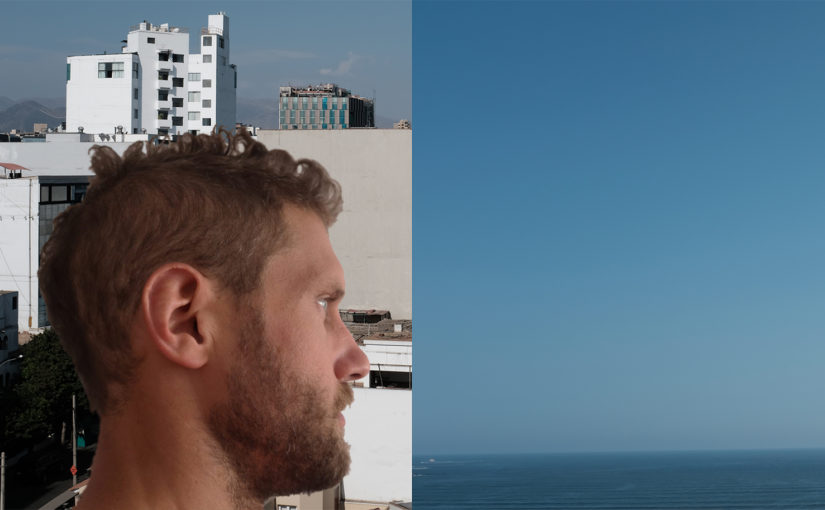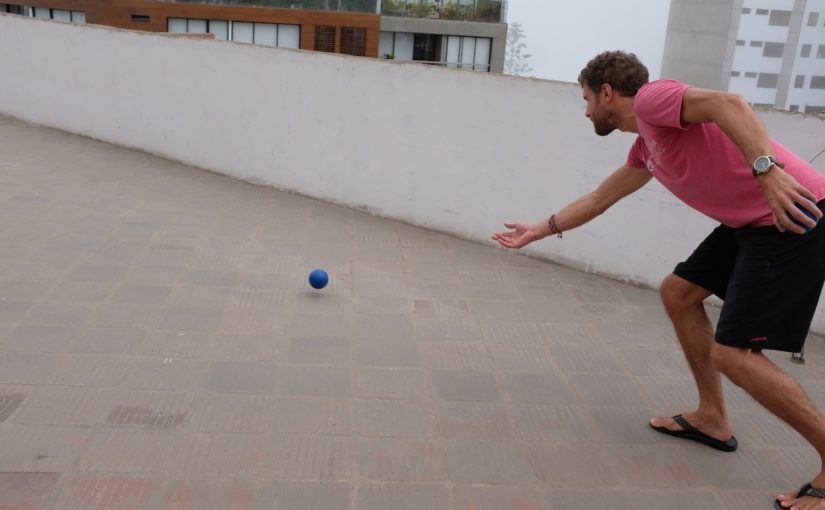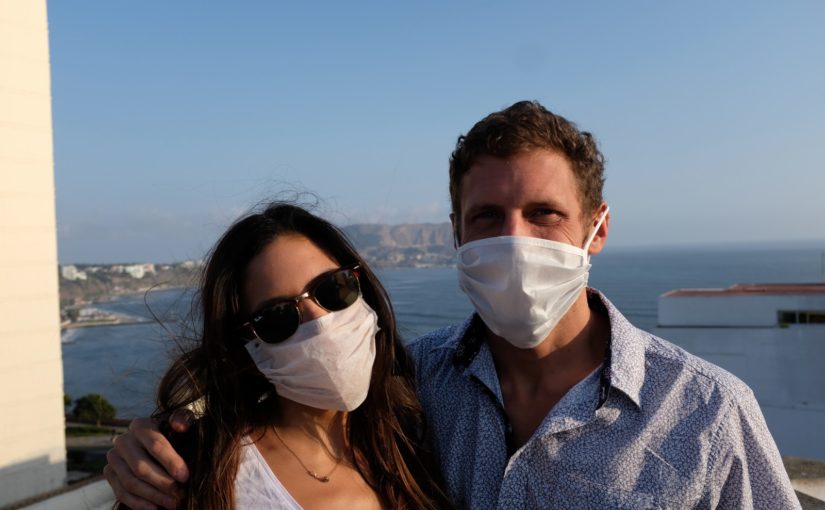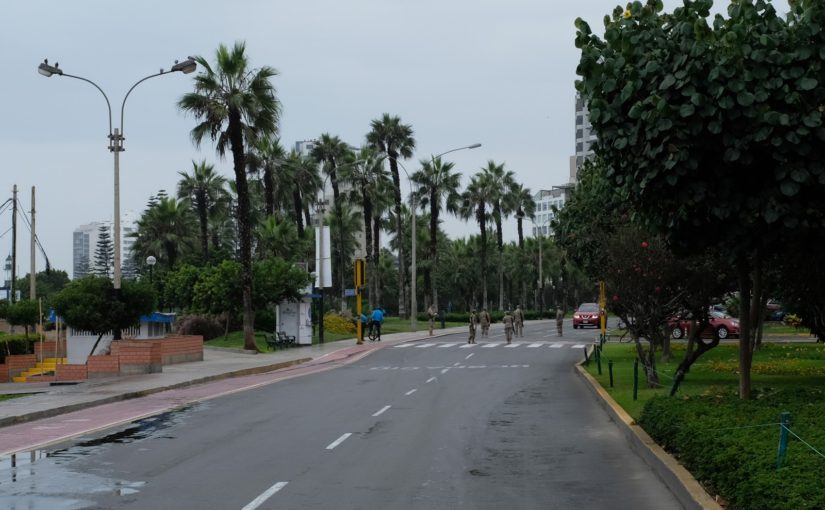Since the start of the quarantine in Peru I have been putting a small recorder out on my windowsill to capture a moment in time that has been a mental and sonic journey more than a physical or visual one. It has been strange, mundane, horrible and beautiful in equal proportions. Here is soundscape in chronological order that is structured to capture my experience on Calle Porta, Miraflores, Peru. The music is from wandering musicians that have taken to the streets to busk and earn money. The background to the entire soundscape is one of the largest surf swells of the year recorded around 5AM at first light.
Tag: miraflores
essential banana bread
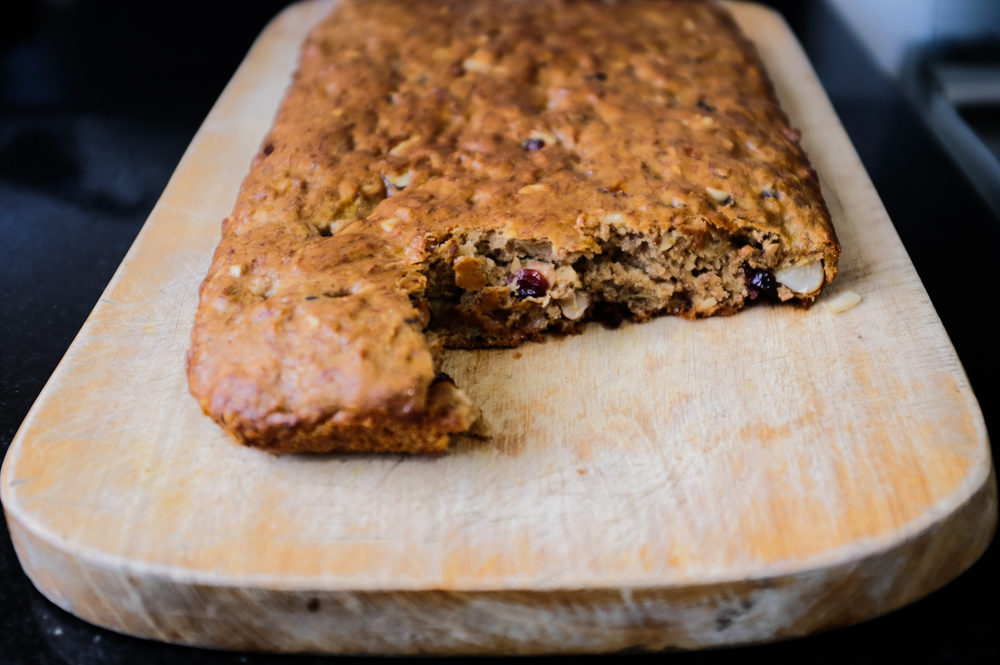
The world at this moment is filled with talk of essential activities. What is an essential activity? It is quite clear at this moment that we could do without or reduce the prevalence of many of the activities that are currently being classified as essential and the world would be a better place. Baking a vegan banana bread for your individual consumption would not be considered an essential activitiy by any standard, but the world would undoubtedly be a better place if there were more breads of this sort being baked and shared. I am comfortable saying this despite baking a bread of this sort requiring one to engage with a defective global economy and purchase ingredients that have a profound environmental and human impact. If you do the calculations, which I have, the ratio of joy:violence in a loaf of vegan banana bread is quite high.
So, I propose that you think about these questions from Virgina Woolf while your banana bread cooks in the oven for 50 minutes at 180C or 350F:
“Let us never cease from thinking — what is this ‘civilization’ in which we find ourselves? What are these ceremonies and why should we take part in them? What are these professions and why should we make money out of them? Where in short is it leading us, the procession of the sons of educated men?”
Ingredients
- 4 overripe bananas (~9 of the small bananas)
- 2/3 cup dark brown sugar (I use panela)
- 1/3 cup vegetable oil of some kind
- Coconut oil to grease the pan
- 2 cups all-purpose flower
- 3.5 teaspoons of baking powder
- 1 teaspoon cinnamon
- 1 teaspoon salt
- 1 cup chopped nuts. (I use Brazil nuts and walnuts)
- 1 cup dried cranberries
- Chop up nuts and toast them in a pan for 3-5 minutes on medium heat until golden-brown. Set them aside.
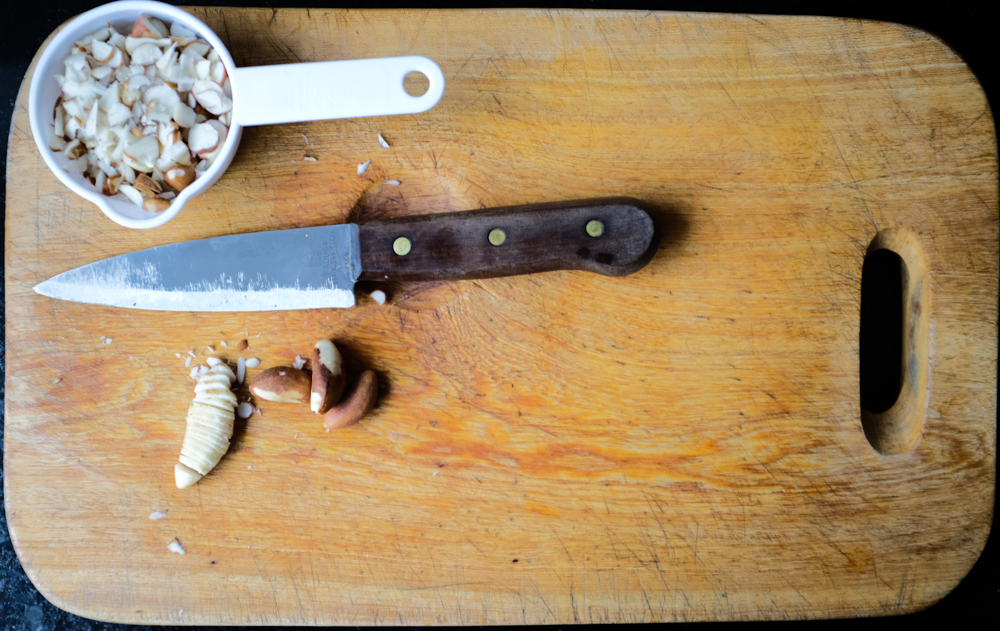
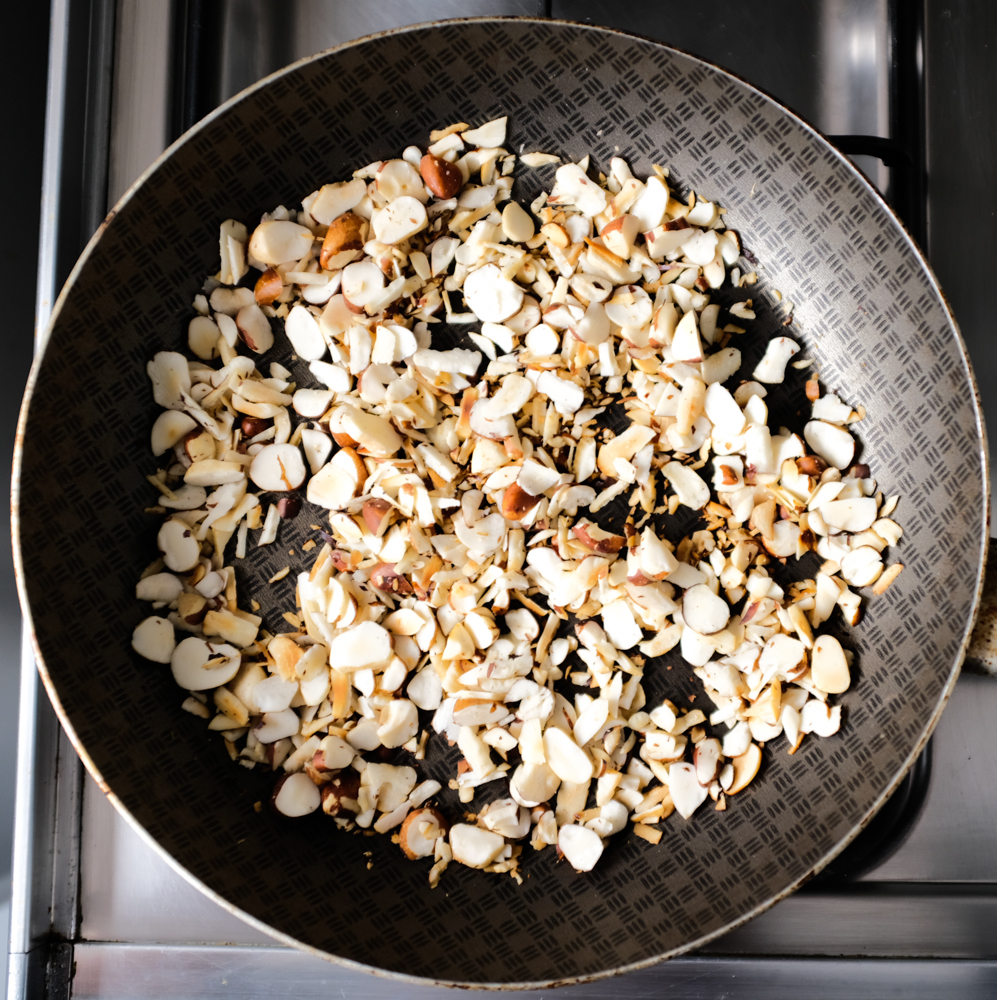
- Preheat the oven to 180C or 350F.
- Mash bananas in large bowl.
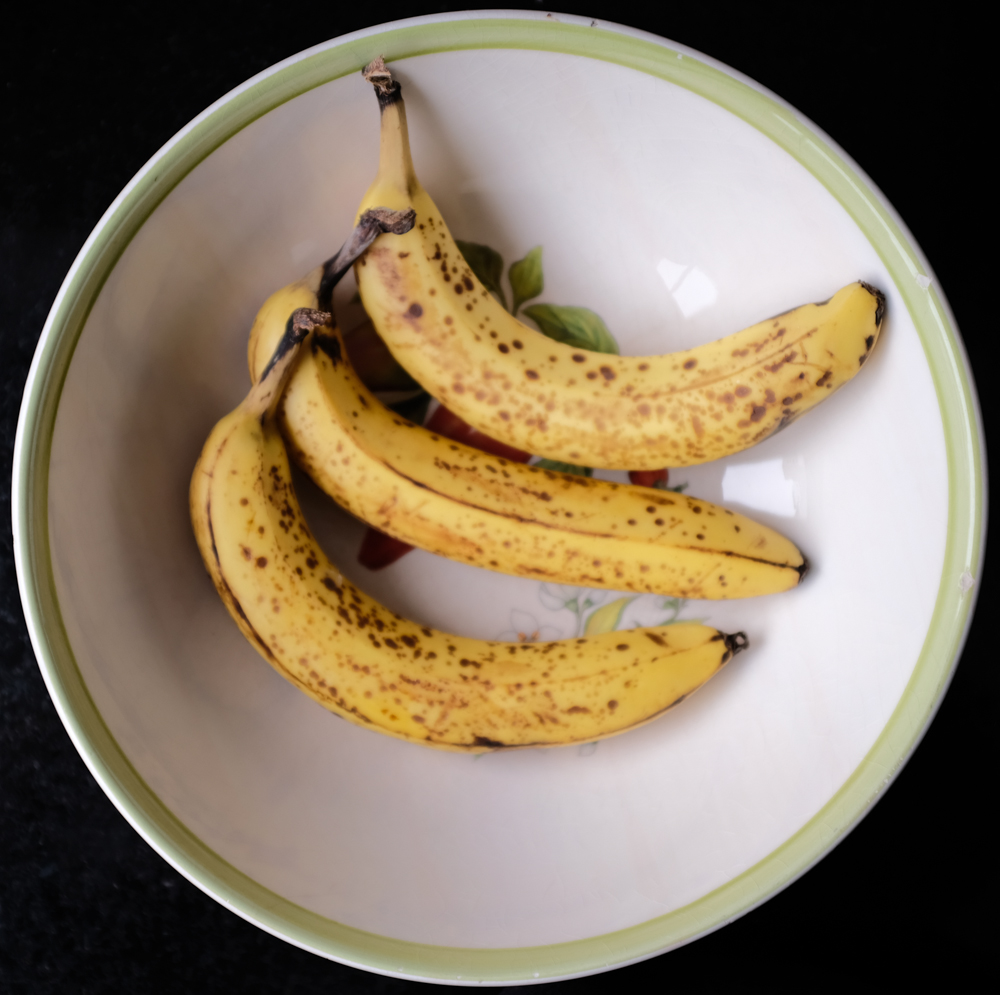
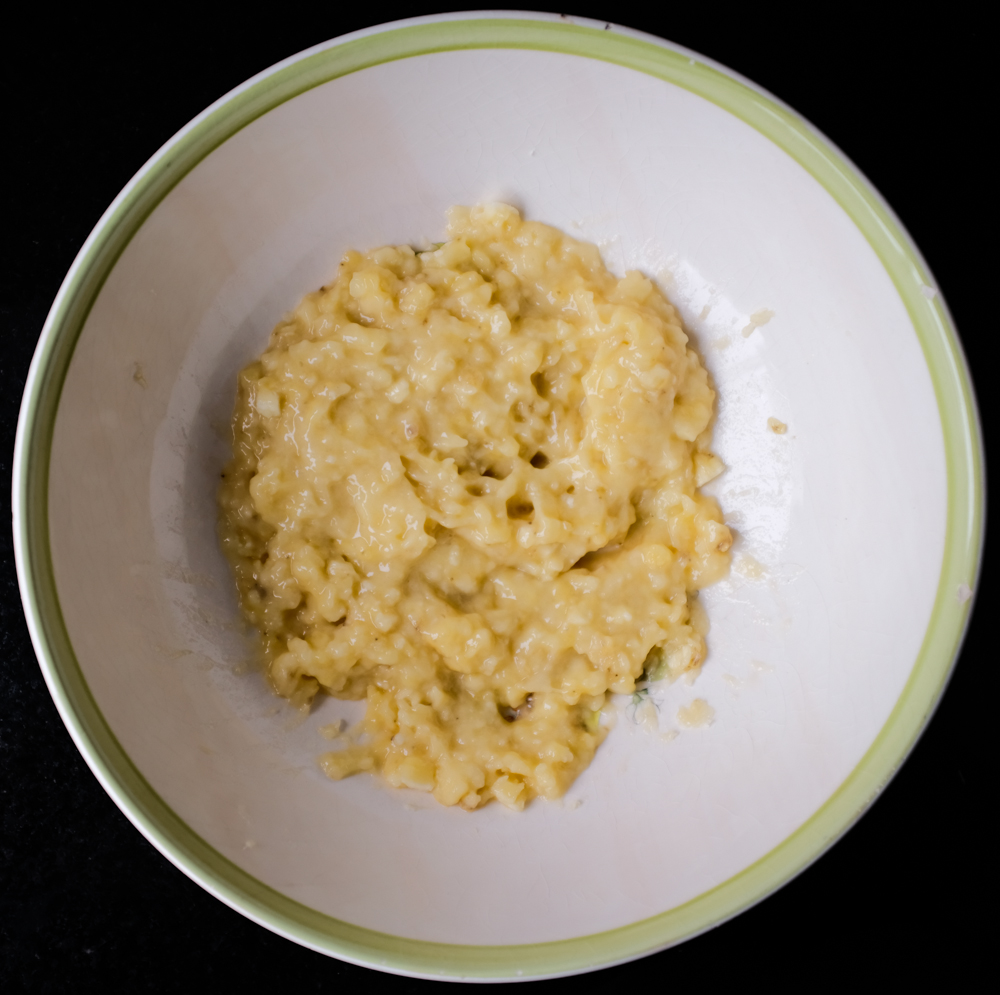
- Add sugar and oil to mashed bananas. Mix thoroughly.
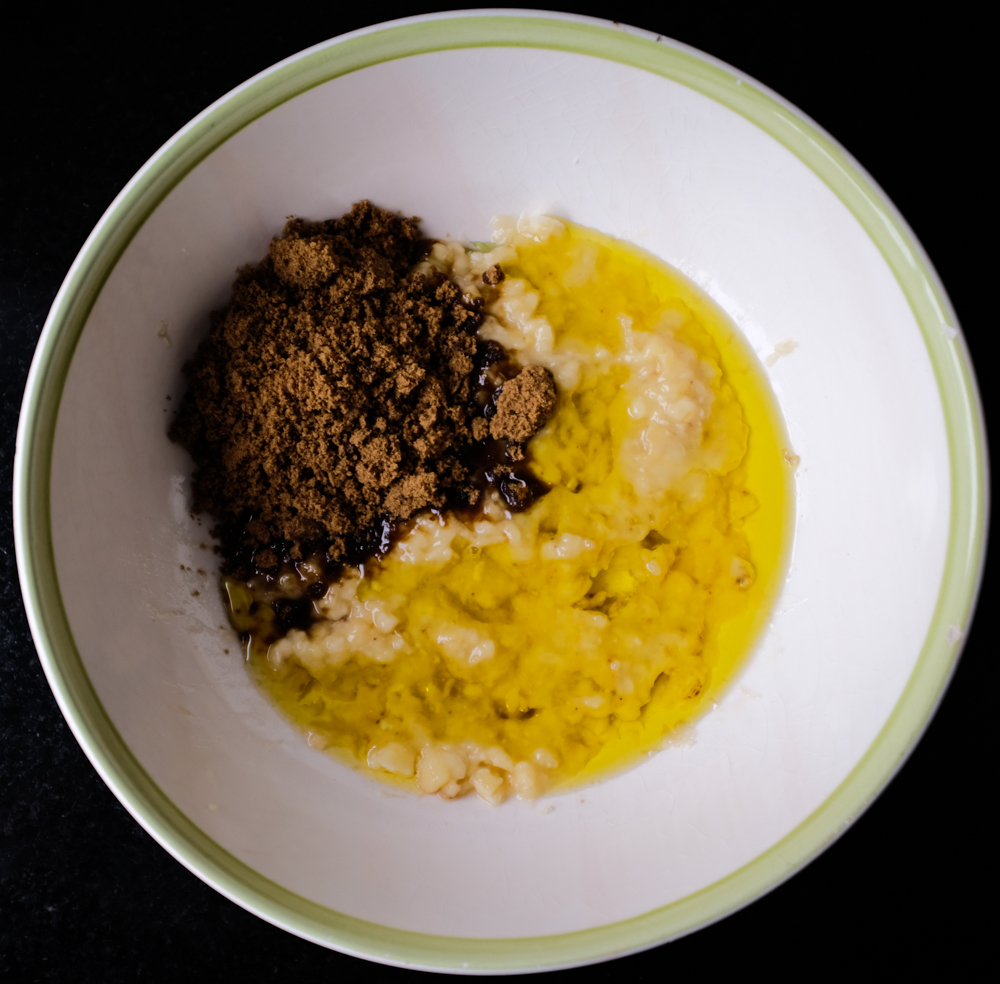
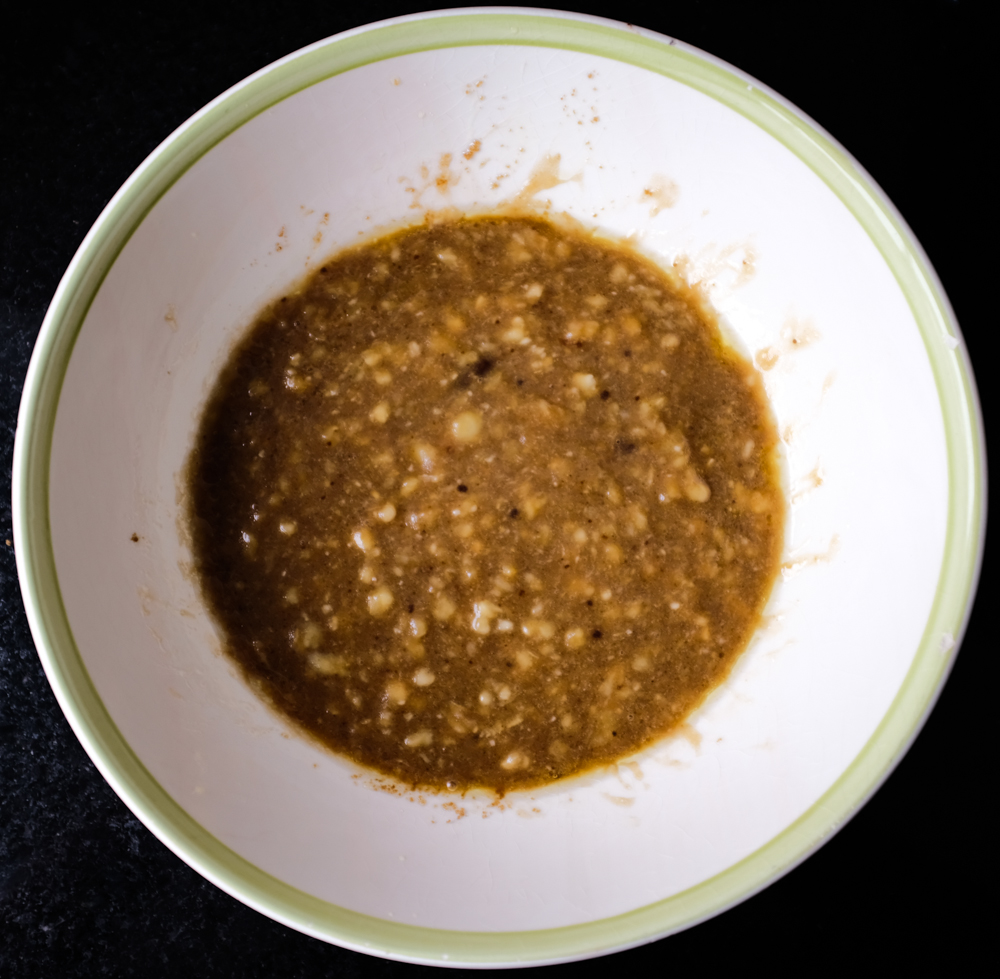
- Add flower.
- Add baking powder, cinnamon, and salt on top of the flour.
- Distriute/mix dry ingredients on top of mixture quickly before mixing them into the banana/oil/sugar. Only mix just enough to ensure that all of the ingredients are properly incorporated and distributed – probably less than a minute – as mixing too much can lead to insufficient rise. It should end up being thick and dough-like.
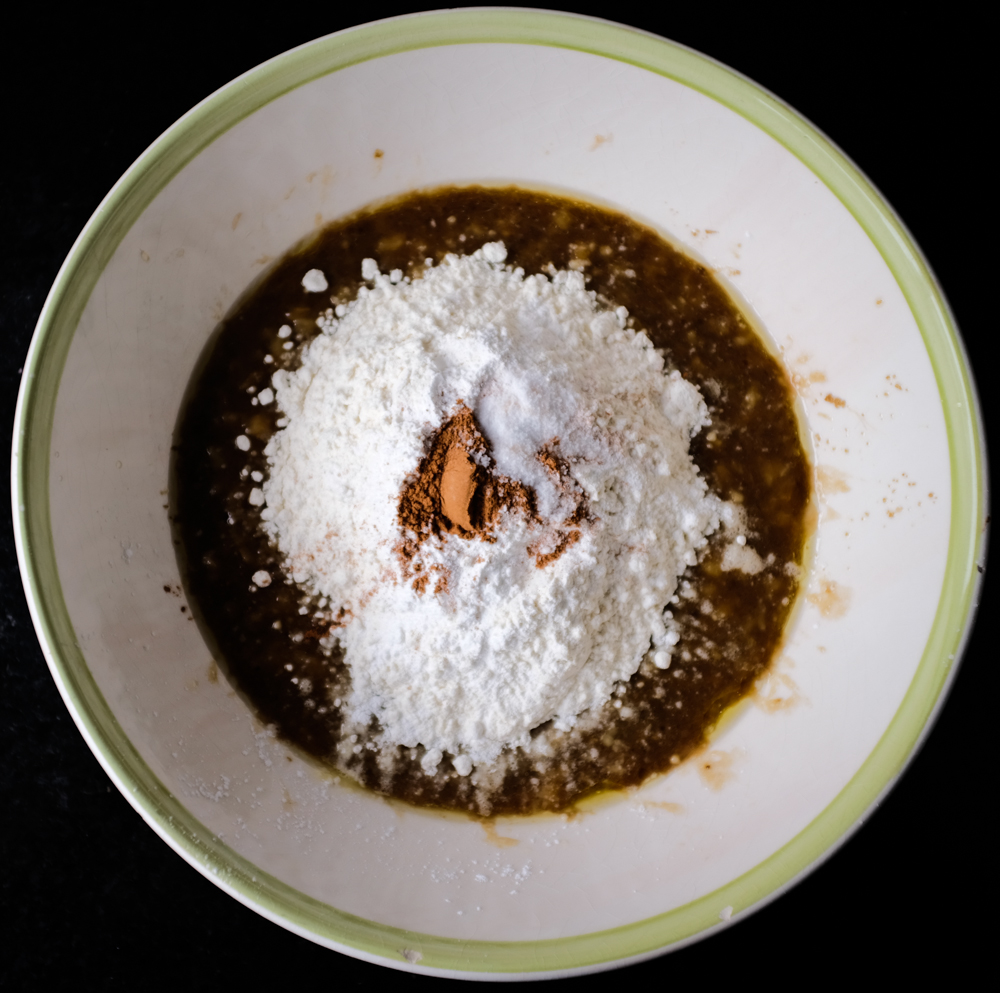
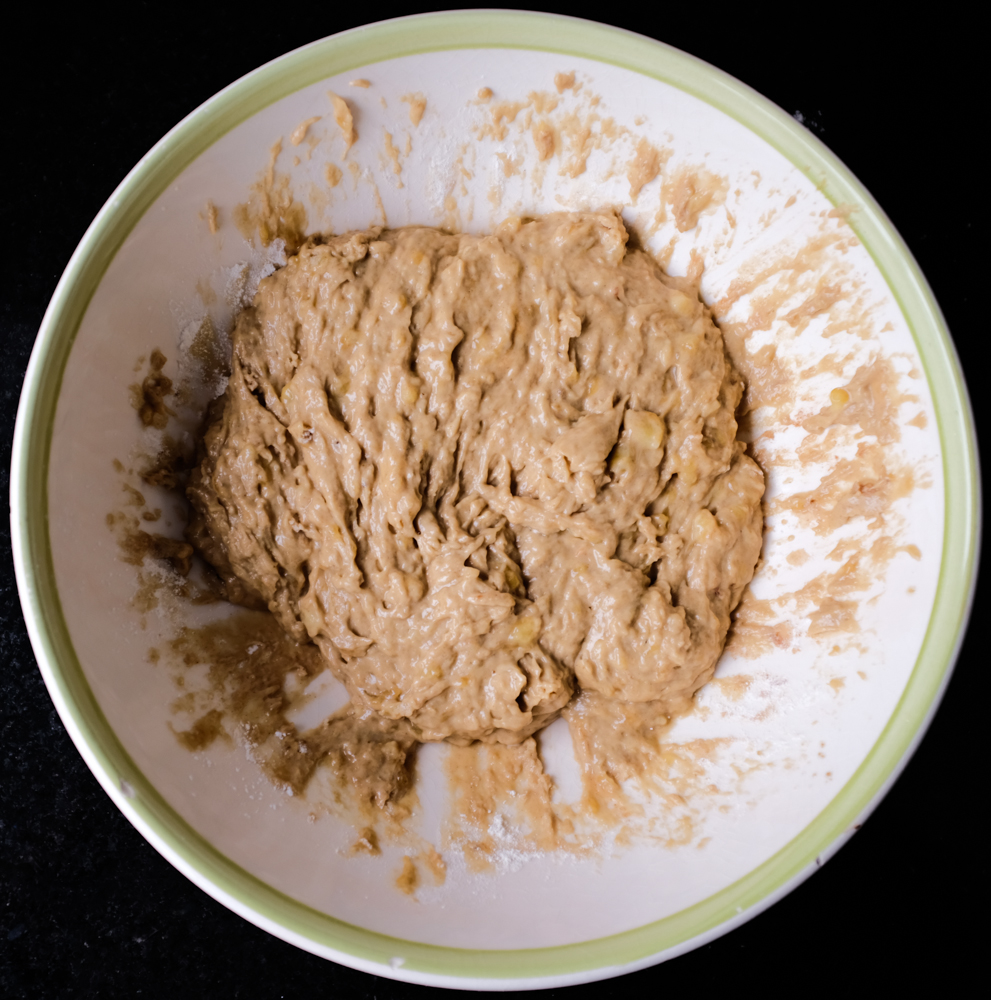
- Add nuts and cranberries and gently fold them intot he mix. Avoid over-mixing.
- Grease your mold with coconut oil that is solid at room temperature.
- Evenly spread the batter throughout the dish.
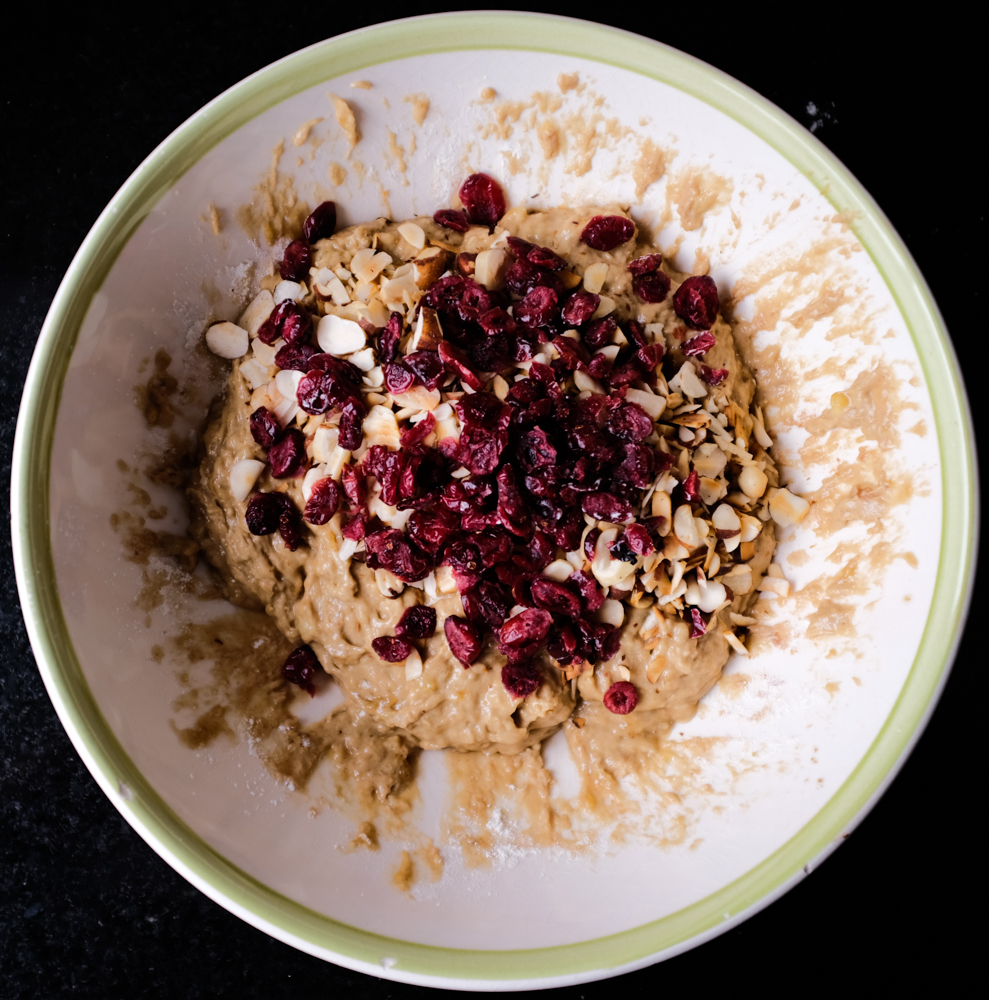
- Toss it in the oven. Bake for around 40-45 minutes – don’t forget about the Virigina Woolf quote.
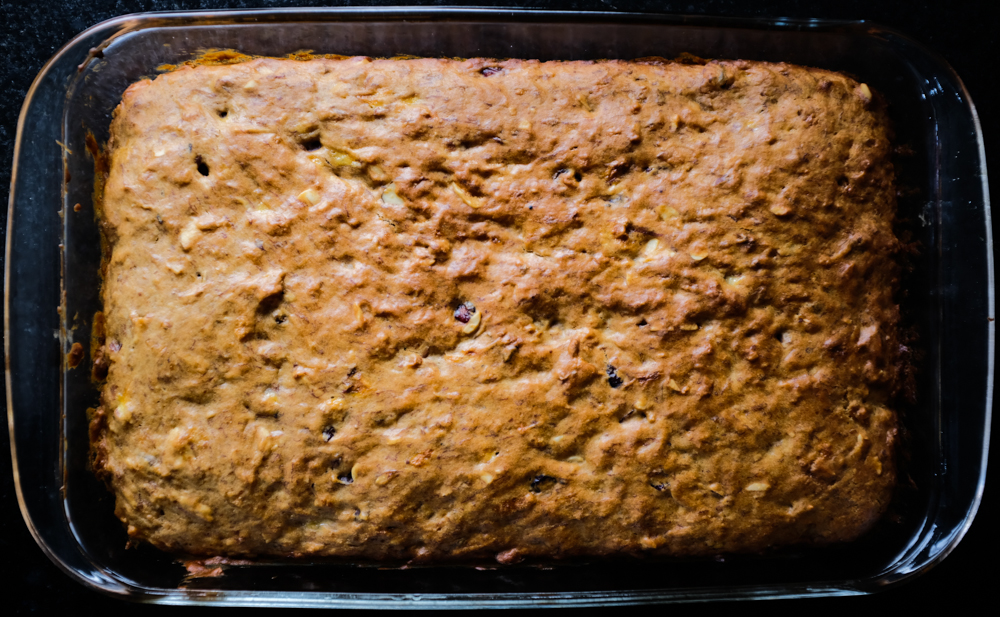
- Remove from the oven and let rest in the dish for a few minutes.
- Flip upside down and remove bread from tray to let the rest of the crust breathe.
pandemic chai tea

Ingredients:
- 1/2 can of coconut milk
- 2 chunks of fresh ginger root larger than your thumb
- 1 chunk of tumeric roof at least the size of your pinky
- 4 black tea bags
- 1.5 tsp allspice
- 1 tbsp, 1 tsp good quality cinnamon
- 1/8 tsp cayenne pepper
- 1/8 tsp black pepper
- 8 cardamom pods
- 2 tbsp brown sugar
Process:
- Put 1 liter of water in whatever type of pot or pan that suits your mood. Maybe that shiny silver one hasn’t been out in a bit? Set it on a high flame.
- Examine the digits of the ginger roots and select a piece that has a volume that is at least equivalent to that of your two thumbs. Select a piece of tumeric root that is also at least the size of your pinky. You do not need to remove the skin from the either, but if the only other option is to look at macabre statistics or read government declarations that you think you don’t understand because you are not a native speaker but that you will later find out that no one understands or become overwhelmed as you read first hand accounts of oxygen tank shortages in the jungle and/or in Lima, then it is recommended that you methodically remove the skin from both in a time consuming fashion.

- Slice the ginger and tumeric into large, thin slices. This will allow the water to easily draw out the flavor and will ensure that you can easily discard them when drinking the tea. Throw them into the pot once finished.
- While you wait for the pot to reach a roaring boil. After months of being trapped in your apartment alone by yourself, you have come to see that you alone have control over how you are going to spend your time and consequently how this day is going to go.
- Take the dull knife that you keep vowing to replace or sharpen, and use the blade to cut or crush the cardmom pods one by one. The seeds inside should be sliced or cracked.

- Add allspice, cinnamon, cayenne, black pepper and cardamom pods into the pot. Stir them in and then use your hand to waft the steam towards you face and breathe deep.

- Go and practice juggling for a bit. After 20 minutes, turn off burner.
- Add black tea bags. Dangle and agitate them in the pot for 2 minutes before taking them out.
- Add in sugar. Stir to make sure that all of it dissolves. Add more to taste.
- Pour in the coconut milk. It is going to seperate and look gross, but it tastes better and you don’t have to think about cows when you drink it.
- Stir the pot and pour yourself a cup of tea.
- Stay away from all electronic devices.
- Sit down somewhere comfortable, preferrably near a window.
- Sip the tea and be wherever you are.
quarantine day 41 – lima vacía
The destructive rhythms of Lima have ground to a halt. I lay on the couch, sit on the floor, pace on the concrete roof, and dream of floating through a redrock desert on a swollen river; of walking though a verdant forest under towering trees; of sitting on a ridge line looking out upon endless ranges. I don’t want to go back.





quarantine day 37
Bare feet back and forth
An infinite blue expanse
just beyond my reach.
¡locked down! neighbors, poo, rubber masks and bocci
It is important for a writer to write about their world with the idealistic hope of arousing the most rarified elements of the human spirit – understanding, empathy, compassion, curiosity – in a reader by providing a window onto that world. Welcome to my balcony caballero.
On Easter Sunday I was reminded of the many countless people around the world performing selfless acts of kindness by my neighbor Linda. She knocked on my door early in the afternoon.
“What kind of mask have you been using?” she enquired. I gestured over to my table and said, “I just have one of the cheap ones from the market that probably don’t do too much.”
“I made these for everyone in the building. Take one of these so that you are safe,” she said with a smile.
She recounted that another resident of our building had ordered a 50 pack of surgical masks, but they arrived and much to her disappointment seemed to be of dubious quality. She rapidly and correctly identified the problem: they allowed too much air to pass through. After multiple experiments sewing in various types of fabric that would filter the air better and limit its free flow, she came across a vinyl shower curtain type material that she had left over from an interior decorating project that she had done years before.
I took the mask and examined it closely, scrutinizing the impermeable rubber layer.
She touted the benefits, “It doesn’t allow anything through. I even tried it with water, and it didn’t allow even one drop through.”

“I hope it allows air through,” I said politely.
“My husband said the same thing,” she said dismissively.
She is right that wearing a mask that doesn’t allow any air to pass through it does make it 100% certain that you will not contract COVID-19 through your airway.
Several of my neighbors would have appreciated these masks over the previous days as tensions rose as rumors spread through the building of a shocking development on the first floor that was compromising all of our health, a sanitary crisis. These rumors in the coming days would lead to baseless accusations being flung around that would pit neighbor against neighbor. It appeared to have been seemingly intentionally left there, carefully placed in the middle of the doormat for maximum effect. Wild theories were put forth, including that someone entered from outside – adding to the concern of contagion. It wasn’t clear if the gate was left unlocked in this theory or if the intruder bypassed the electric fence that surrounds the building. The inferno was stoked by the fact that the building’s management was safely ensconced in their homes due to the quarantine rendering revision of the security cameras impossible.

The pulse-quickening suspense of this interminable wait combined with the restrictive nature of my newly acquired mask drove me to the roof of the building. To play bocci. Without a mask. As I ascended with my friend Olga, we passed one of my neighbors that I hadn’t met beforehand named Pierre. We exchanged pleasantries and carried on our way.
In the midst of our bocci game, Pierre joined us on the roof to introduce himself.

“Hi – Im Pierre.” We introduced ourselves. “I live in apartment 302. I am a photographer and I am losing all of my inspiration being trapped in the building with no one to shoot. And when I saw you guys pass on the stairs I thought that it would be great to take photos of you. We could wait for a day with nice light – like today – and just do something casual. Let me show you my work on Instagram to see if you are interested.”
We scrolled through his photos. All of them were of sultry women dressed in lingerie giving the camera provocative glances, well unless they were bent over in a way that might lead to a neck injury if they tried to look into the lens. I didn’t know what to say, so I didn’t say anything. Thankfully, Olga carried the conversation by changing the subject and switching to French. We exchanged contact info, but I don’t think that Pierre wants to have a photoshoot with me.
living in my underwear and conversing with flies
My mental state ebbs and flows. Never before have I had the chance to run an experiment like this, to sit for weeks on end in the same place, largely determining what each second of my day looks like. These conditions can precipitate out the good and toxic elements that flavor each day. This is what it looks like.
The city is quite quiet. There are no cars, no people after 6pm. A voice speaking any language other than Spanish or a car that sounds abnormal bring me to the window to look out. I have seen five different species of bird in Lima that I did not know existed beforehand – I wake up each morning to their raucous calls and songs as if I am in the jungle. These emerald and cerulean birds were always here, they didn’t migrate with the virus, they were simply rendered mute by the urban machine. I live several blocks from the beach and my bedroom now sounds like I am on the beach each night; I can tell when a swell comes in from how loud the waves are as they tumble the rocks along the coast.
It has been impressive how quickly the measures that we are enduring have become reasonably normalized. The initial discomfort that resulted from the repressive confinement has faded and has been replaced by a mere ennui. There have now been multiple days in a row when I haven’t left my apartment and haven’t really felt much of an urge to do so. Every couple of days the government imposes even more draconian policies and each time it bothers me less. We are at the point where I can only legally go outside during two days this week – just for groceries and while wearing a mask. These are strange times though. Everyone wears masks. We all avoid one another in the street. No two people walk together. I see a video online of a body or person being removed from a building two blocks away from me on a stretcher enclosed in a clear plastic bubble.
Each morning I get up to meditate. I feel inordinately sensitive to everything that happens around me. I imagine that this is a direct result of the sensory deprivation that I am experiencing. I observe the doves that roost outside my window as they gather materials to build their nest. I watch the flies and bugs that live in my apartment with intense curiosity. I slowly approach them to avoid spooking them, bringing my eye close for a macroview. I have even caught myself speaking to them, in jest I tell myself, but maybe this is how insanity begins?
My mental state is directly correlated to how much I stare at the amidst whirling media vortex that gathers up – often without regard for the dubiousness of its origin – and spews forth medical reports without sufficient explanation, information about unproven cures, geopolitical propaganda related to the crisis, anecdotes from frontline workers, reports of shortages, recipes for quarantine comfort foods, reports of surpluses, reports of boredom, reports of exhaustion, reports of bodies in the street, fun craft projects, discussions of how to dress for online meetings, reports of stock markets surging, and reports of economies collapsing. Charlatans become scientists. New comedic geniuses arise. Politicians proclaim themselves doctors and epidemiologists. Those pandering false hope become heroes. Doomsayers become prophets.
I have started having frequent nightmares about the virus, earthquakes and the death of loved ones. I woke up screaming once this week. My quotidian existence though is relatively mundane. Weekends are a meaningless concept. I regularly lose track of what day of the week it is as it is irrelevant. I do little laundry as most of my days are spent in my underwear or my pajamas.
I met a girl – Olga – a few weeks before the quarantine started that was here in Lima for a work project for several months. We are very different people, but when the quarantine was imposed, we found ourselves trapped in our respective apartments alone. Her work promptly laid her off and she is working to find her way back to Santiago. We began visiting one another to have company, moving between one another’s apartments by taking specific routes on which we are less likely to encounter police with our addresses memorized and grocery shopping bags in hand. We now spend several days each week together cooking, reading, watching movies, drinking wine and helping each other to navigate these strange and difficult times. We have become close friends, forced together under the circumstances to openly share our lives with on another.
I watch other countries with horror as I sit feeling relatively safe in Peru due to the stringent measures that have been imposed. Ecuador serves as a reminder of what could happen here. I find myself thinking about exit strategies for Peru, about political/economic/medical measures to strike a manageable balance between cases, medical resources, and the need for a functional economy. I wonder about what travel will look like three months from now: without a vaccine how can global travel function?
These are strange times in good ways as well. Each evening I head up to the barren concrete roof that caps my building to watch the sunset. A few nights ago, there was a rare clear sky above Lima. Olga and I finished a bottle of wine as we looked up at the stars and fantasized about what we will do and where we will travel when this is all over. We talk about how good we truly have it in this very moment, that it is all just a matter of perspective.
week 1 of quarantine in peru
How life has changed in the past week reminds of this quote from Hemmingway’s “The Sun Also Rises”:
“How did you go bankrupt?” Bill asked.
“Two ways,” Mike said. “Gradually and then suddenly.”
There was one case, then a few days later six cases. The response from many was that these were just imported cases and that there was no community transmission, hence no need to be overly concerned. Nonetheless, there were reasons for anyone who understands the economy and institutions of Peru to be gravely concerned about the country’s ability to handle an epidemic that require extreme caution and a proactive response:
- Lima has roughly 10-11 million residents densely packed into the city. These citizens use overcrowded public transportation to commute and Lima would never be held up as an example of a city with good hygiene and sanitation practices.
- The Peruvian public healthcare system before the arrival COVID-19 appeared to be underfunded and quite stressed to meet demand. In any case, the healthcare system in Peru is far inferior to the completely overwhelmed system of Italy.
- An estimated 73% of the workforce is employed in the informal sector. These people are working in jobs that often pay minimum or less than minimum wages. These may be people who work in professions that don’t pay taxes such as in an informal markets or roaming the street selling soda or food. In any case, these are not people who generally have significant savings to weather economic or medical hardship.
- There are an estimated 800,000 Venezuelans that have arrived fleeing their home country’s economic and political ruin. It is difficult to find hard data, but I think it would be safe to say that the majority of the Venezuelans here do not have significant savings and are employeed in professions that do not provide any form of safety net (informal sector). Many people are working in restaurants, bars, delivery services or on the street.
In the past few weeks various reports and articles were published that detailed what measures had proved successful in China, Korea, Hong Kong and Taiwan in their battle against the virus. These articles highlighted widespread and rapid testing, social distancing measures and contact tracing as being of vital importance to flattening out the slope of the caseload. Thinking began to shift – it was now widely acknolwedged that global community spread was inevitable, but that measures needed to be taken to avoid a health crisis of unknown magnitude. Few people in Peru seemed to think that the government would be capable of implementing strict quarantines, widespread closures of businesses or the degree of social distancing that would be required to properly control the spread of the disease.
On Friday (13/3) it seemed quite apparent to me that things were getting serious and that our lives were going to change, although still seemed a bit distant in this moment. My honest reaction, along with that of my friends, was to go out drinking to say good-bye and toast to the end of the world as we knew it.
On Sunday (15/3) rumors began circulating that there was to be a message from the president to the nation in the afternoon. The administration was unable to keep a lid on the subject matter of this message and it was widely circulated on Whatsapp that a strict quarantine/stay-at-home order was to be be announced.

I had been following the news in the US and had gone out shopping during the last week to bulk purchase essential things like rice and beans. I decided to head to the store to stock up on some other items, but primarly to get a feeling for the public response to the rumors. When I arrived at the store, a greeter sprayed with hands with alcohol and then I merged into the mass of people walking briskly through aisles and bumping into one another as they frantically grabbed items. The shelves of rice and beans were empty, although there were notices announcing the rationing of essential items. I was stockpiling non-essential items: onto the non-essential items: peanut butter, olive oil and bottles of wine and liquor
At 8pm the president of Peru – Martin Vizcarra – announced that Peru was declaring a state of emergency for the next 15 days or until the end of the month. This meant that there would be a strict quarantine/stay-at-home order put into place – people would only be allowed to leave their homes to purchase essential items, to work in an essential industry, to seek medical care or to help the elderly/disabled. The borders would be closed to all passenger transport. Peru would also halt all internal transport. Essential services would remain open – hospitals, supermarkets, banks and pharmacies.
I fully support the Peruvian governments decision. It has comforted me that the government is taking the situation seriously and responding appropriately, but it has definitely raised my personal anxiety levels. The situation for myself as a foreigner here had already become quite complicated; the virus had already caused the organization where I work to make significant cuts and to plan for further cuts that threaten my job. I don’t know if I will have a job going forward, I don’t know what will happen to my family/friends in the US and I don’t know when I will be able to see them again. But I have built a life here that I simply cannot abandon with a few days notice.
After the announcement was declared, I went out with a few friends to have our last supper. The Indian food that we ate was delicious, but the restaurant was packed with foreigners and the staff seemed quite anxious to get us out of there and close. We went to a nearby Irish pub, I was expecting there to be a spirit of reckless abandon and end-of-the-world comraderie, but the mood was somber. Most people stared down at their phones as they tried to understand what was going on here and globally.
Day 1 (16/3/2020) – I didn’t sleep that night as the quarantine went into effect. At 5am the city was completely quiet and the birds sang outside my window in the dark. There was a good swell in and I could hear the waves crashing against the coast. There had been no specific communication around surfing and a text I had received said that the rules did not go into effect until 8am, so I decided to go for it. I put on my wetsuit, grabbed my new board and then ran bare-footed down the dark, quiet streets. I stretched on a bridge that straddles the coastal highway and read the surf. After five minutes, I decided to see if anyone would stop me. The normal police officer stood near the bottom of the stairs, but he faced away as he watched a video on his phone. With barefeet, I was able to pass by him without making a sound.

I zipped up my wetsuit and paddled out into frothing lines. I paddled with intensity, trying to get some of the stress and anxiety out of my body. I had assumed that there would be many other people with the same idea, but there was not another soul in the water. The majority of the waves were too large for the break and simply exploded as they arrived – impossible to ride. Reading large waves correctly and positioning yourself can be difficult with other people competing for waves, but after half an hour and a few incredible waves there was still not another person surfing at this break or any of the others along the coast. I forgot about the virus and the state of the world as I carved across the faces of glassy towering waves. Boobies and pelicans rode the faces of the waves and dove into the water around me. I fell off a wave and looked at the coast – there were four police cars and roughly 25 people on the shore that all appears to be watching me. I became concerned, but I figured that pleading ignornace would suffice. In any case, I kept surfing as there was no reason to cut the session short. I caught one last incredible wave – going airborn as I came off the lip as it closed out. I decided to head in.
As I arrived at the shore the three dozen police officers and government officials just stared at me. One government official was filming me with his phone. I unzipped my wetsuit and then ran half naked and bare-footed back to my apartment without exchanging a word with anyone.
Despite the epic surf session, it was quite a difficult day. The air was thick with anxiety and concern regarding the virus, but also the economy. I had become transfixed by the spread of the epidemic over the past two months and under quarantine there was not much to do but simply watch the spread of the virus and the deterioriation of the markets. The sentiment and moment reminded me all too well of the financial crisis in 2008. There was still significant movement around the city of cars and pedestrians – everyone was getting situated and the government had allowed two days of flexibility – but only to a certain degree – to enable everyone to arrive home.
Day 2 (17/3/2020) – I live by myself and I turned to family, co-workers and friends to distract myself and navigate this difficult time. We exchanged hilarious memes from people in similar situations, checked up on how everyone is doing and gossiped about the future. My mood oscillated between seriousnes due to the gravity of the situation and gallows humor to cope with my absolute lack of control.
The government became concerned that large segments of the populace that were already in a difficult economic situation may turn towards looting and crime. A curfew from 8pm-5am was therefore imposed. The government declared that it will give roughly $120USD to the 3 million most vulnerable Peruvians, although they made it clear that Venezuelans will be excluded from this assistance.
I went out for a long walk to the store. I make a lavish dinner accompanied by wine and icecream. I sleep deeply in the quiet of the night with the sea breeze pouring in the window.
Day 3 (18/3/2020) – The mood has changed a bit – there are now soldiers in the streets with roadblocks set up at various points.

My day is occupied with two things:
- The cash flow and budget situation at work has gotten more complicated. Employees are notified that our hours will be cut and that certain employee’s contracts may be terminated early.
- I watch from afar in horror as the US government continues to struggle to create an effective response to the rapidly spreading virus. I feel like the US in recent years has turned into an artificial dream (or nightmare): a debt fueled, globalized orgy that relies upon the populace lying to themselves to keep the party going. The country chose a reality TV, informercial president to lead it and his gross insuitability to lead a nation is on full display during these times of adversity. Viruses do not care about rhetoric – nature will leave a pile of bodies in the background as you spin falsehoods. President Trump is overly focused on the economic reprecussions, but fails to understand that the repercussions of an unchecked epidemic for which the US has done little to prepare will lead to far graver economic consequences than imposing appropriate and stringent measures early on. Many politicians, scientists and medical professionals in the US have the additional advantage of troves of data and information from countries where the outbreak has already struck, but have also been slow to sound the alarm. Many did use the assymetry of knowledge to dump their stock portfolios before the market crashed though.
At 8pm I suddenly heard clapping. The entire city came out on their balconies and leaned out windows to clap for the first responders, the doctors, the nurses, the police, sanitation workers – everyone who is risking their life to keep this city operating. This hasn’t been easy for anyone, so it also feels like a show of solidarity, a recognition of the sacrifices that everyone is making for the common good. It made me feel less alone and my eyes welled up with tears as I clapped and whistled.
Day 4 (19/3/2020) – In the early morning darkness – before the birds start singing – there was not a single sound other than the subtle roar of the surf. The city has likely never been this quiet in modern times. I stuck my head out the window and there were no people, no cars, no smell of exhaust. I laid back down and reveled in the beauty of the moment before reality started creeping in.

I put on my shoes and headed out for a quick run. Other people are out walking their dogs, so I don’t perceive this as being an issue. People do look at me strangely though. I reach a nearby park without having any issues and run a half dozen laps before making my way back home. The Peruvian quarantine does not make exceptions for exercise or give guidelines for how to properly go outside, but if the quarantine is to be maintained for a long period of time, it will be necessary for mental health that citizens can resume exercising and walking freely within appropriate constraints. I was personally hoping to do a lot of surfing with my downtime, but the entire coast has been closed – the ocean is empty of people.
Videos circulate on Whatsapp of the police beating people and arresting people that are violating the curfew or movement protocols, of police firing guns into the air to clear people of the streets. It scares me that the situation here could deteriorate if the virus and civil order are not carefully manged.
I watched Samsara and my conclusion was that there has never been a more appropriate time to watch this movie. It is a meditation on how far humanity has disconnected itself from nature, but also from our own spirituality, in our quest for perpetual growth and dominion over the earth. I wonder with some anxiety and shameful yearning if the virus might lead to the wholesale collapse of the order that I have known for my entire life and something better might emerge as a result. Part of me sees collapse and a reset as necessary for the planet and the long term well-being of humanity. Any manmade system is bound to collapse, especially one built on perpetual growth, boundless destruction and ever increasing complexity. The more complex and larger a system becomes, the more dire the consequences will be as it unravels and collapses.
I lay in bed thinking about Robinson Jeffers, a poet who wrote around the time of the Great Depressionan and WWII, that has inspired me greatly with his philosophy of inhumanism. He defines it as “a shifting of emphasis and significance from man to notman; the rejection of human solipsism and recognition of the trans-human magnificence.” I feel like this philosophy is quite apparent in this excerpt from his poem “The Broken Balance”:
III
That light blood-loving weasel, a tongue of yellow
Fire licking the sides of the gray stones,
Has a more passionate and more pure heart
In the snake-slender flanks than man can imagine;
But he is betrayed by his own courage,
The man who kills him is like a cloud hiding a star.
Then praise the jewel-eyed hawk and the tall blue heron;
The black cormorants that fatten their sea-rock
With shining slime; even that ruiner of anthills
The red-shafted woodpecker flying,
A white star between blood-color wing-clouds,
Across the glades of the wood and the green lakes of shade.
These live their felt natures; they know their norm
And live it to the brim; they understand life.
While men moulding themselves to the anthill have choked
Their natures until the souls die in them;
They have sold themselves for toys and protection:
No, but consider awhile: what else? Men sold for toys.
Uneasy and fractional people, having no center
But in the eyes and mouths that surround them,
Having no function but to serve and support
Civilization, the enemy of man,
No wonder they live insanely, and desire
With their tongues, progress; with their eyes, pleasure; with their hearts, death.
Their ancestors were good hunters, good herdsmen and swordsman,
But now the world is turned upside down;
The good do evil, the hope’s in criminals; in vice
That dissolves the cities and war to destroy them.
Through wars and corruptions the house will fall.
Mourn whom it falls on. Be glad: the house is mined, it will fall.
IV
Rain, hail and brutal sun, the plow in the roots,
The pitiless pruning-iron in the branches,
Strengthen the vines, they are all feeding friends
Or powerless foes until the grapes purple.
But when you have ripened your berries it is time to begin to perish.
The world sickens with change, rain becomes poison,
The earth is a pit, it Is time to perish.
The vines are fey, the very kindness of nature
Corrupts what her cruelty before strengthened.
When you stand on the peak of time it is time to begin to perish.
Reach down the long morbid roots that forget the plow,
Discover the depths; let the long pale tendrils
Spend all to discover the sky, now nothing is good
But only the steel mirrors of discovery . . .
And the beautiful enormous dawns of time, after we perish.
V
Mourning the broken balance, the hopeless prostration of the earth
Under men’s hands and their minds,
The beautiful places killed like rabbits to make a city,
The spreading fungus, the slime-threads
And spores; my own coast’s obscene future: I remember the farther
Future, and the last man dying
Without succession under the confident eyes of the stars.
It was only a moment’s accident,
The race that plagued us; the world resumes the old lonely immortal
Splendor; from here I can even
Perceive that that snuffed candle had something . . . a fantastic virtue,
A faint and unshapely pathos . . .
So death will flatter them at last: what, even the bald ape’s by-shot
Was moderately admirable?
Day 5 – (20/30/2020) – The global projections have gotten significantly worse. Cases have spiked in the US as testing has begun to gradually increase. My anxiety is heightened as two of my family members work in the medical field: one in a fire department/ambulance service and another works in an intensive care unit at the hospital. It seems to be commonly accepted knowledge of those working in the field that there are far more cases in the community than are being confirmed and reported.
Within the organization where I work we were notified regarding further serious financial cutbacks and several employees are forced to decide whether they should upend their lives and return immediately to their home countries or if they are committed to staying indefinitely in Peru without income in coming months. Normally, when their is a crisis like this, residents of wealthy nations simply flee home until it passes. This case is different as at this moment the wealthy nations are the epicenter of the outbreak. Peru has more proactively responded to the crisis and appears to be better poised to contain the outbreak than US, the UK, or Europe. There are two main concerns going forward in Peru:
- What if Peru proves incapable of containing the outbreak – how will the situation unfold?
- Whether Peru contains the outbreak or not, it is quite luckly that transportation to the country will be disrupted for a significant amount of time. This represents a pretty scary scenario, especially with uncertainty looming over our jobs. I will likely be saying goodbye to some friends that I may not see again for a long time, if ever.
For the past week I felt dumbstruck and unable to concentrate. I tried to read and I couldn’t. I tried to write and I couldn’t. I tried to meditate and my mind writhed with thoughts. It looks like this could potentially go on for months. I realize that I am not in that good of mental shape and that I must find a better daily routine and way to navigate these difficult times. I am generally inclined to shut down and close myself off. In this case, I have surprisingly been willing to admit that I am scared, anxious and lonely. I have been trying to keep it in mind that everyone else is in the same position and been working to reach out for everyone’s mutual benefit. I vowed to try to get into a better routine the following day. To meditate, to write and to meter my news intake.
I decided to walk to the market, which is quite far away. On the way two men yelled from across the street offering me cocaine and marijuana.
“Just try it! You don’t have to pay for it if you don’t like it.”
I just laughed and asked them if they are out of their minds. As I approached the market I got apprehensive. I am not too worried about sanitary conditions in markets most of the time, but something seemed to bother me about buying anything in the market that has been handled by too many people or that is just sitting out on display at this moment. The main door to the market was three quarters closed and not very much natural light appear to make it inside. I couldn’t bring myself to enter and buy anything – I turn around and begin my walk back to my apartment.
Day 6 (21/3/2020) – As I meditated in the morning my mind continued to churn, but I seemed to derive a certain about of equanimity merely from sitting in the corner of my room. Nothing happened. Life continued outside. The sun rose and the breeze rocked the curtains. I go up to the terrace and watch a flock of countless seabirds diving and feasting upon a school of sardines. They are closer to the shore than I have ever seen them before, clearly because there are no people or boats. It is a beautiful scene. I think about how animals and ecosystems have been under assault by humanity for thousands of years – they are getting a rare reprieve.

In the afternoon I went to the supermarket to buy a few items for dinner. I walked in the middle of the street to avoid walking near othe people on the sidewalk. A police car approached me and slowed down. It paced me perfectly with the police officer staring at me from behind dark sunglasses before he stopped and got out of the vehicle. With his face only half-visible behind a mask, he motions motion me over to the sidewalk and we begin speaking in Spanish:
“Do you speak Spanish?” The officer asks me.
“Yes, I live here.”
“Can I see your permission to be walking right now?” He asks forcefully.
“I am going to buy groceries. I am on my way to the supermarket.” I point to the supermarket nearby.
“You need to be carrying a bag if you are going to the grocery store and without a bag you don’t have permission to be walking in the street right now. We are taking people like you to jail. I am going to call for another officer.”
“I am carrying a backpack – that is my bag.”
“A backpack is not a bag.” He points towards another pedestrian with a normal shopping bag – “That is a bag.”
“That is a bag, but a backpack is also a bag. It is actually better than a bag because I can carry more groceries in this backpack.”
“To us a backpack means that you are a tourist and you don’t have papers to be walking in the street.”
“I am going to the grocery store to buy food. I don’t need to be carrying papers to do so.”
“But you don’t have a bag. And where is your mask? You should have a mask.”
We went in circles for a few minutes longer until the other officer, presumably his supervisor arrives. The officer with whom I had been speaking approached the vehicle and explained the situation to the supervisor. The supervisor doesn’t even look at me and seems irritated that he was even called here. The officer then returned, took a photo of my ID and told me to hurry up and do my shopping.
I felt a bit rattled after this as I watched dozens of people pass with dogs and backpacks I feel as if I was profiled and hassled for no clear reason. I am worried that the police and soldiers will not maintain an appropriate balance between the humane treatement of people involved in this crisis and ensuring that the government mandate is enforced.
Before the curfew took effect for the night I heard shouting outside that echoed between the buildings. There was an overweight well-off man with a miniature Chihuahua berating a guy who is picking through the trash from behind a mask – something that only someone in a dire situation does.
“Get out of here! You are breaking the law! You are putting everyone at risk. I am calling the police!” He has his phone out and is videotaping the poor guy.
Everyone was leaning out their windows and on their balconies. I bit my tongue and did not say anything out of fear of creating problems for myself.
I am very concerned about a breakdown in civility and compassion. The virus carries risks globally and that is why it is now being treated differently than the other atrocities that are currently ongoing and have killed hundreds of thousands. It doesn’t care about wealth, borders, geopolitics, religion, or race. In fact, the virus helps to expose how inequalities, political rhetoric, corruption and privitization of basic services put us collectively at risk. An unequal society in which a person is forced to dig through the trash to feed themselves leaves everyone at greater risk of a serious epidemic, but the blame for this cannot be put on the individual that is digging through the trash. We need to be compassionate and take care of one another. If you see someone digging through the trash – whether during an epidemic or not – give them money or food instead of threats and shaming.
Buscando a Alex
The Metropolitano in Lima is much more than just public transport – if you let it, it can carry you from dream to reality and vice versa. It is truly a bargain.
You set out walking towards the Metro station that is only a few blocks away from the heart of Miraflores. Beautiful people abound in Miraflores; the sound of heels clicking resounds as people go from cafes to restaurants to shops with smartly-attired canines. Lovely old couples dance in the main park amidst well-fed stray cats that stretch and preen.

Tourists saunter around staring at the world through the screens of phones and cameras. Verdant trees line the streets with leaves that flutter in the breezing that is blowing off of the Pacific. Luxury cars emerge from towering walls topped with electrified barbed-wire.
You stop for a coffee and overhear two American girls talking and staring at their phones.
“Ugh look at this guy – Pedro – he just superliked me. Uhhh BYE.”
“How are you even on Tinder right now? The WiFi here sucks. This site says that the Art Museum is cool.”
“Yeah, but it isn’t here on the list of the top five things to do in Lima.”
A few stops away and you enter reality. As you step off the train people look at you strangely; you can tell that you are out of place. A few of them will stop to tell you that you will be robbed. Most people hurry about with their purses or backpacks clutched to the front of their bodies. Trash blows around on the greasy streets or lies heaped in piles. You try your best to keep your wits about you, while at the same time avoiding tripping on any crumbling sections of sidewalk or inexplicable gaping holes. The people whose office or shop is the street look out at you from weary eyes set in faces that appear to have long ago tired of this place. The sidewalk and road are used as shops with cars, bicycles, televisions, and appliances in various states of disassembly or repair strewn about. You have to step over mangy dogs and parts as you walk. The air is filled alternatingly with smells of frying food, urine, truck exhaust, and trash rotting in the sun. Reggaeton blasts out of cars and stereos as bottles of beer are passed around. When you ask for something specific you are told, “Hay de todo” and then are told where it can be found.

You sit on a bench eating popcorn and watch the world go by. You reflect upon your life. How are the hands that some people are dealt so different from those of others? How nice are the bed time stories that we are told about equal opportunity, fairness, and justice that let us fall gently back into our dream. An elderly lady frying dough hands gifts you a heaping plate smothered in honey saying that she wants you to have nice memories from Peru. You think about how the current president of Peru, under threat of impeachment for receiving bribes in order to steer a contract to a Brazilian construction company, just brokered a deal to pardon a former president of the opposition party that was convicted of “serious crimes against humanity” in order to avoid being removed from office. The former president oversaw death squads that killed thousands of indigenous people in horrific ways and directed the forced sterilization of over 300,000 women. He was just released.
You have dinner later with friends. The topic of Peru’s independence from Spain comes up. You say the following:
“I am pretty sure, like most independence movements, it was powerful people looking to get more power, control, and wealth for themselves. The revolution happens, but the same power structures stay in place. I imagine the people of Spanish descent continued to control the land and wealth of the nation, but they simply no longer had to pay taxes to Spain. But not much changed for the poor or indigenous people. That is how the revolution happened in the United States as well.”
A very well-educated and clearly wealthy Peruvian girl responds in perfect English:
“That is not how it happened here in Peru. It was for the benefit of all Peruvians since we don’t have racial groups or classes like that here – we are all of mixed descent.”
She looks nothing like the people without electricity or running water in the mountains. You don’t say anything because you don’t want to make a scene in front of a group of people that you have just met.
You are a gringo.
